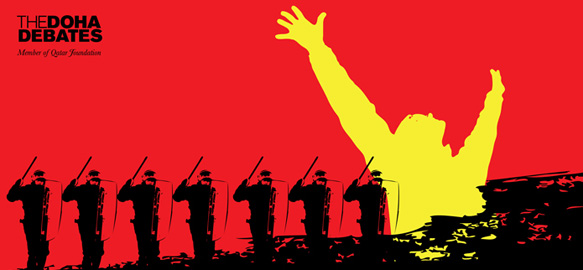Turmoil in the Arab world
Wednesday, February 09 2011

An audience at a special Doha Debates public forum was told on Tuesday, February 8, that the revolution in Tunisia was not a media revolution, but rather a revolution in the media age.
"Media is not an institution but a force. A revolution is driven by people out on the streets campaigning and pushing for their rights; the media supports this process but does not drive it," Dr. Mohamed Zayani, Associate Professor of Critical Theory at the Georgetown University School of Foreign Service in Qatar, said.
Dr. Zayani and Rachid Khechana, the Head of North Africa for the Al Jazeera Network, spoke about the role of social media in the region's recent political upheaval and how technological advances will shape the future of events in Egypt and other Arab nations.
Dr Zayani argued that other factors such as politics and history were significant in the overthrow of the Ben Ali regime and that the role of the media is evolving with the advent of new technologies.
Mr. Khechana told the audience that Tunisian bloggers and online activists had developed an expertise due to their experience evading and dodging censorship under Ben Ali and that these lessons could be shared with protestors in Cairo and in other parts of the world. When asked what the future of media in the Arab world might look like, he responded by saying, "better than it has been in the past.
“I am hopeful and positive about the impact that new media can have on political reform. But we should not forgot the role that TV stations and newspapers continue to play", he added.
During the question and answer part of the evening students and members of the public questioned the speakers, both Tunisians and media experts, on the nature of the new online leadership and its ability to deliver in the political sphere. Questions were also asked about the possibility of revolution or revolt spreading to other Arab countries and what factors led to the uprisings in Tunisian and Egypt.
The session was held at Carnegie Mellon University, Education City, and was attended by more than 60 students and members of the community. The event was the second of its kind to be organised by The Doha Debates.
